英语语法错误经典例子(四)
- 格式:docx
- 大小:15.11 KB
- 文档页数:4

英语句子改错英语作为一门国际性语言,常常被人们用于交流和沟通。
然而,即使我们在学习英语的过程中付出了很多努力,有时候还是会犯一些语法错误。
本文将介绍一些常见的英语句子错误,并提供一些纠正方法。
1. 主谓一致错误主谓一致是英语语法中的重要部分。
在一个简单句中,主语和谓语动词应该在人称和数上保持一致。
以下是一个例子:错误句子: My brother and sister is coming to visit me tomorrow.纠正后的句子: My brother and sister are coming to visit me tomorrow.2. 动词时态错误时态是指动词所表示的动作或状态发生的时间。
在句子中,时态错误常常给人造成困惑。
以下是一个例子:错误句子:I didn’t went to the party last night.纠正后的句子:I didn’t go to the party las t night.3. 冠词误用冠词是英语中常用的词汇,用于限定名词。
然而,我们有时会使用错误的冠词或者不使用冠词。
以下是一个例子:错误句子: I want a apple.纠正后的句子: I want an apple.4. 副词修饰错误副词被用来修饰动词、形容词和其他副词。
然而,有时候我们会使用错误的副词或者将副词放在错误的位置上。
以下是一个例子:错误句子: She speaks English good.纠正后的句子: She speaks English well.5. 语序错误英语中的语序是固定的,主语在前,谓语在后。
当我们将词组或者从句放在错误的位置上时,就会出现语序错误。
以下是一个例子:错误句子: Yesterday I have visited my grandmother.纠正后的句子: I have visited my grandmother yesterday.6. 拼写错误拼写错误是我们在使用英语时常常犯的错误之一。
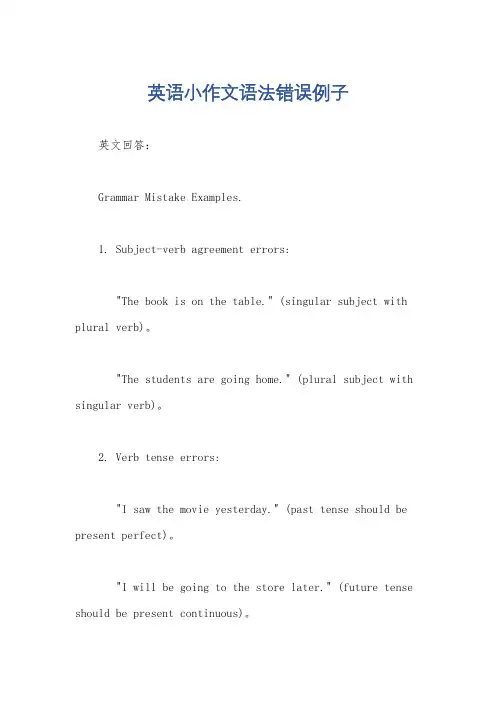
英语小作文语法错误例子英文回答:Grammar Mistake Examples.1. Subject-verb agreement errors:"The book is on the table." (singular subject with plural verb)。
"The students are going home." (plural subject with singular verb)。
2. Verb tense errors:"I saw the movie yesterday." (past tense should be present perfect)。
"I will be going to the store later." (future tense should be present continuous)。
3. Pronoun errors:"I gave the book to she." (incorrect pronoun case)。
"The dog and cat are playing with each other." (incorrect pronoun reference)。
4. Adjective and adverb errors:"The car is very fast." (incorrect use of adverb)。
"The book is more interesting than the movie." (incorrect use of comparative adjective)。
5. Preposition errors:"I went to the store at the street." (incorrect preposition)。
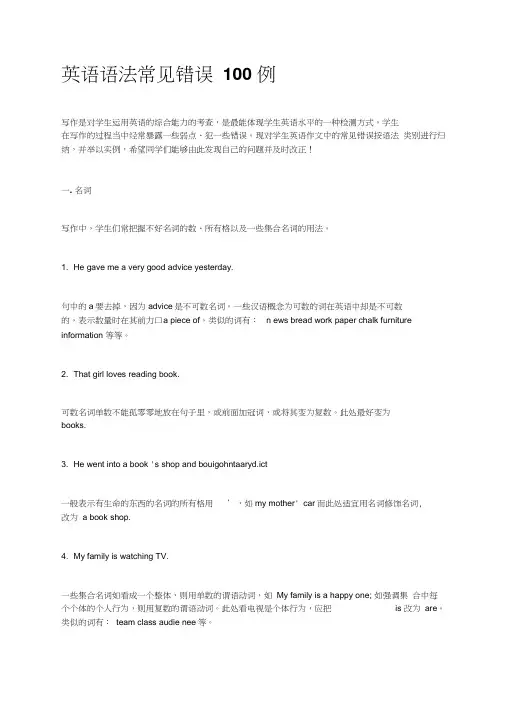
英语语法常见错误100 例写作是对学生运用英语的综合能力的考查,是最能体现学生英语水平的一种检测方式。
学生在写作的过程当中经常暴露一些弱点、犯一些错误。
现对学生英语作文中的常见错误按语法类别进行归纳,并举以实例,希望同学们能够由此发现自己的问题并及时改正!一. 名词写作中,学生们常把握不好名词的数、所有格以及一些集合名词的用法。
1. He gave me a very good advice yesterday.句中的a要去掉,因为advice是不可数名词。
一些汉语概念为可数的词在英语中却是不可数的,表示数量时在其前力口a piece of,类似的词有:n ews bread work paper chalk furniture information 等等。
2. That girl loves reading book.可数名词单数不能孤零零地放在句子里,或前面加冠词,或将其变为复数。
此处最好变为books.3. He went into a book 's shop and bouigohntaaryd.ict一般表示有生命的东西的名词的所有格用’,如my mother' car而此处适宜用名词修饰名词,改为 a book shop.4. My family is watching TV.一些集合名词如看成一个整体,则用单数的谓语动词,如My family is a happy one; 如强调集合中每个个体的个人行为,则用复数的谓语动词。
此处看电视是个体行为,应把is 改为are。
类似的词有:team class audie nee等。
5. I bought some potatos and tomatos at the supermarket.中学阶段以“o结尾的名词中有四个词变复数时要加es,它们是tomato potato Negro hero;其余的都加s变为复数。
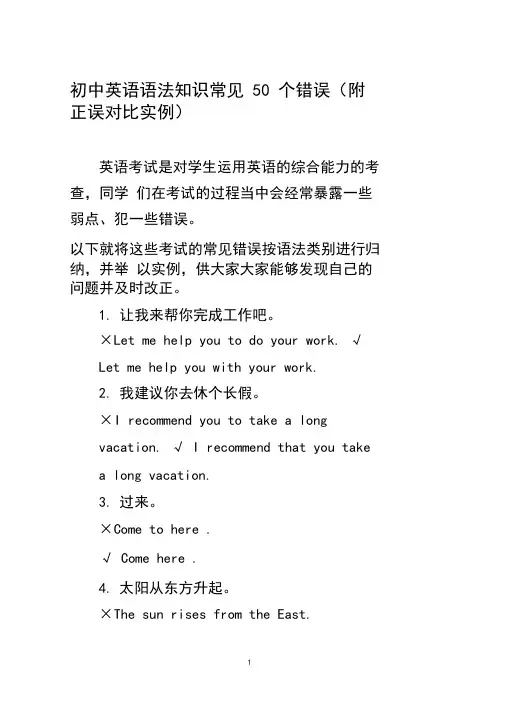
初中英语语法知识常见50 个错误(附正误对比实例)英语考试是对学生运用英语的综合能力的考查,同学们在考试的过程当中会经常暴露一些弱点、犯一些错误。
以下就将这些考试的常见错误按语法类别进行归纳,并举以实例,供大家大家能够发现自己的问题并及时改正。
1.让我来帮你完成工作吧。
×Let me help you to do your work. √Let me help you with your work.2.我建议你去休个长假。
×I recommend you to take a longvacation. √ I recommend that you takea long vacation.3.过来。
×Come to here .√ Come here .4.太阳从东方升起。
×The sun rises from the East.√ The sun rises in the East.5.小偷是从窗户爬进来的×The thief got in from the window.√ The thief got in through the window.6.让我们从第10 页开始。
×Let's begin from page 10.√ Let's begin at(on) page 10.7.我耐心有限。
×There is a limit in my patience.√ There is a limit to my patience.8.请在白线内等待。
×Please wait inside the white line. √ Please wait behind the white line.9.你家房子买了火险吗?×Is your house insured for fire?√ Is your house insured against fire?10.我没地方住。
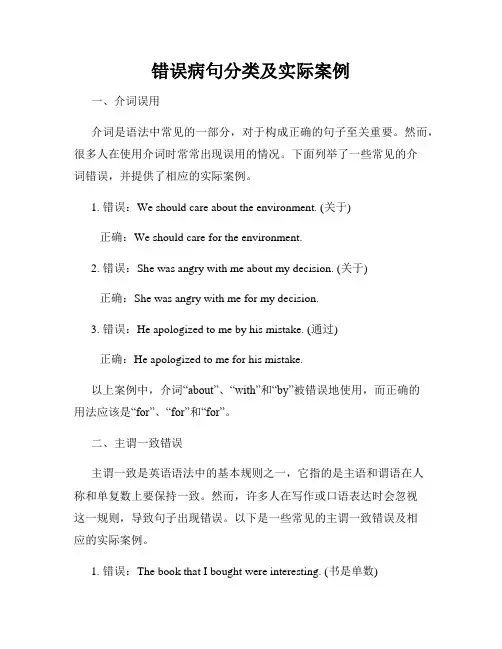
错误病句分类及实际案例一、介词误用介词是语法中常见的一部分,对于构成正确的句子至关重要。
然而,很多人在使用介词时常常出现误用的情况。
下面列举了一些常见的介词错误,并提供了相应的实际案例。
1. 错误:We should care about the environment. (关于)正确:We should care for the environment.2. 错误:She was angry with me about my decision. (关于)正确:She was angry with me for my decision.3. 错误:He apologized to me by his mistake. (通过)正确:He apologized to me for his mistake.以上案例中,介词“about”、“with”和“by”被错误地使用,而正确的用法应该是“for”、“for”和“for”。
二、主谓一致错误主谓一致是英语语法中的基本规则之一,它指的是主语和谓语在人称和单复数上要保持一致。
然而,许多人在写作或口语表达时会忽视这一规则,导致句子出现错误。
以下是一些常见的主谓一致错误及相应的实际案例。
1. 错误:The book that I bought were interesting. (书是单数)正确:The book that I bought was interesting.2. 错误:My friends is coming to visit me. (朋友是复数)正确:My friends are coming to visit me.3. 错误:She plays basketball every day, but my brother don't like it.(弟弟是第三人称单数)正确:She plays basketball every day, but my brother doesn't like it.以上案例中,主语和谓语之间的一致性被忽略,导致句子出现错误。
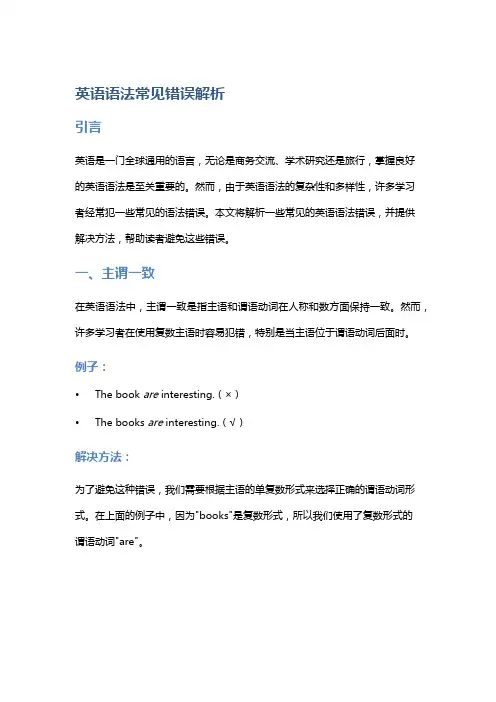
英语语法常见错误解析引言英语是一门全球通用的语言,无论是商务交流、学术研究还是旅行,掌握良好的英语语法是至关重要的。
然而,由于英语语法的复杂性和多样性,许多学习者经常犯一些常见的语法错误。
本文将解析一些常见的英语语法错误,并提供解决方法,帮助读者避免这些错误。
一、主谓一致在英语语法中,主谓一致是指主语和谓语动词在人称和数方面保持一致。
然而,许多学习者在使用复数主语时容易犯错,特别是当主语位于谓语动词后面时。
例子:•The book are interesting.(×)•The books are interesting.(√)解决方法:为了避免这种错误,我们需要根据主语的单复数形式来选择正确的谓语动词形式。
在上面的例子中,因为"books"是复数形式,所以我们使用了复数形式的谓语动词"are"。
二、冠词的用法错误冠词在英语语法中的使用是让很多学习者感到困惑的问题之一。
有时候,学习者会忽略冠词的使用,导致语法错误。
例子:•I want to buy a iPhone.(×)•I want to buy an iPhone.(√)解决方法:使用冠词时需要根据后面的词的发音来选择正确的冠词。
在上面的例子中,由于"Iphone"这个词的发音以元音音素开头,所以我们需要使用冠词"an"。
三、动词时态错误英语的动词时态非常丰富,但是许多学习者在使用时态时容易出错。
一个常见的错误是将动词的过去分词形式与助动词"have"以及"has"错误地搭配使用。
例子:•I have went to the park yesterday.(×)•I have gone to the park yesterday.(√)解决方法:在这种情况下,正确的形式应该是"have gone"。
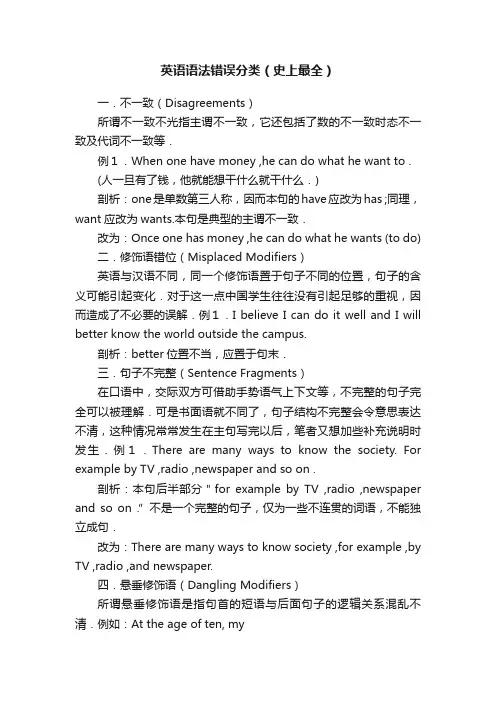
英语语法错误分类(史上最全)一.不一致(Disagreements)所谓不一致不光指主谓不一致,它还包括了数的不一致时态不一致及代词不一致等.例1.When one have money ,he can do what he want to .(人一旦有了钱,他就能想干什么就干什么.)剖析:one是单数第三人称,因而本句的have应改为has ;同理,want应改为wants.本句是典型的主谓不一致.改为:Once one has money ,he can do what he wants (to do) 二.修饰语错位(Misplaced Modifiers)英语与汉语不同,同一个修饰语置于句子不同的位置,句子的含义可能引起变化.对于这一点中国学生往往没有引起足够的重视,因而造成了不必要的误解.例1.I believe I can do it well and I will better know the world outside the campus.剖析:better位置不当,应置于句末.三.句子不完整(Sentence Fragments)在口语中,交际双方可借助手势语气上下文等,不完整的句子完全可以被理解.可是书面语就不同了,句子结构不完整会令意思表达不清,这种情况常常发生在主句写完以后,笔者又想加些补充说明时发生.例1.There are many ways to know the society. For example by TV ,radio ,newspaper and so on .剖析:本句后半部分"for example by TV ,radio ,newspaper and so on .”不是一个完整的句子,仅为一些不连贯的词语,不能独立成句.改为:There are many ways to know society ,for example ,by TV ,radio ,and newspaper.四.悬垂修饰语(Dangling Modifiers)所谓悬垂修饰语是指句首的短语与后面句子的逻辑关系混乱不清.例如:At the age of ten, mygrandfather died. 这句中"at the age of ten"只点出十岁时,但没有说明” 谁”十岁时.按一般推理不可能是my grandfather, 如果我们把这个悬垂修饰语改明确一点,全句就不那么费解了.改为:When I was ten, my grandfather died.例1.To do well in college, good grades are essential.剖析:句中不定式短语“to do well in college” 的逻辑主语不清楚.改为:To do well in college, a student needs good grades.五.词性误用(Misuse of Parts of Speech)“词性误用”常表现为:介词当动词用;形容词当副词用;名词当动词用等.例1.None can negative the importance of money.剖析:negative 系形容词,误作动词。
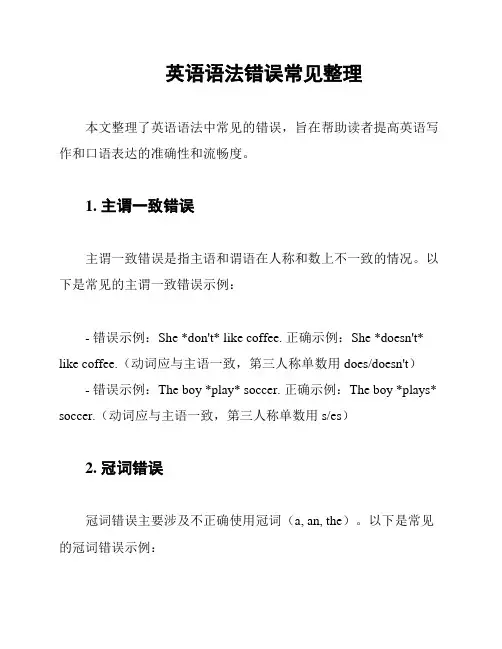
英语语法错误常见整理本文整理了英语语法中常见的错误,旨在帮助读者提高英语写作和口语表达的准确性和流畅度。
1. 主谓一致错误主谓一致错误是指主语和谓语在人称和数上不一致的情况。
以下是常见的主谓一致错误示例:- 错误示例:She *don't* like coffee. 正确示例:She *doesn't* like coffee.(动词应与主语一致,第三人称单数用does/doesn't)- 错误示例:The boy *play* soccer. 正确示例:The boy *plays* soccer.(动词应与主语一致,第三人称单数用s/es)2. 冠词错误冠词错误主要涉及不正确使用冠词(a, an, the)。
以下是常见的冠词错误示例:- 错误示例:I want *a* apple. 正确示例:I want *an* apple.(在单数可数名词前,以元音音素开头使用an)- 错误示例:I need to buy *the* bread. 正确示例:I need to buy *some* bread.(不确定名词时使用some,确定名词使用the)3. 时态错误时态错误是指在句子中误用了不恰当的时态。
以下是常见的时态错误示例:- 错误示例:I *am seeing* a movie tomorrow. 正确示例:I *will see* a movie tomorrow.(表示将来时间时使用will)- 错误示例:He *has gone* to the store now. 正确示例:He*went* to the store now.(表示过去时间时使用过去式)4. 动词形式错误动词形式错误指的是动词的不正确形式。
以下是常见的动词形式错误示例:- 错误示例:She *have* a cat. 正确示例:She *has* a cat.(第三人称单数要用has,而不是have)- 错误示例:I *buying* a book tomorrow. 正确示例:I *will buy* a book tomorrow.(在将来时态中使用助动词will)5. 句子结构错误句子结构错误是指句子中存在不正确的结构或语序。
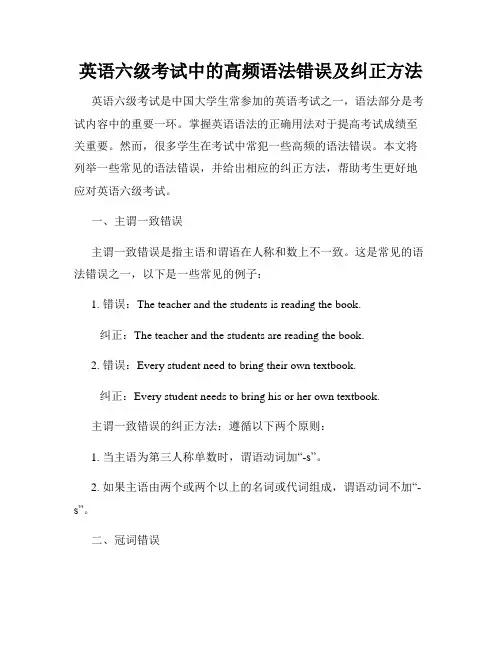
英语六级考试中的高频语法错误及纠正方法英语六级考试是中国大学生常参加的英语考试之一,语法部分是考试内容中的重要一环。
掌握英语语法的正确用法对于提高考试成绩至关重要。
然而,很多学生在考试中常犯一些高频的语法错误。
本文将列举一些常见的语法错误,并给出相应的纠正方法,帮助考生更好地应对英语六级考试。
一、主谓一致错误主谓一致错误是指主语和谓语在人称和数上不一致。
这是常见的语法错误之一,以下是一些常见的例子:1. 错误:The teacher and the students is reading the book.纠正:The teacher and the students are reading the book.2. 错误:Every student need to bring their own textbook.纠正:Every student needs to bring his or her own textbook.主谓一致错误的纠正方法:遵循以下两个原则:1. 当主语为第三人称单数时,谓语动词加“-s”。
2. 如果主语由两个或两个以上的名词或代词组成,谓语动词不加“-s”。
二、冠词错误冠词错误包括使用错误的冠词或者省略冠词。
以下是一些常见的例子:1. 错误:She is working in university.纠正:She is working in a university.2. 错误:I want to eat apple.纠正:I want to eat an apple.冠词错误的纠正方法:根据以下准则使用冠词:1. 用"a"或"an"来表达泛指或不特定的事物。
2. 用"the"来表示特定的事物,或在前面已经提到的特定事物。
三、介词错误介词错误包括使用错误的介词或者省略介词。
以下是一些常见的例子:1. 错误:I am good English.纠正:I am good at English.2. 错误:She is interested playing piano.纠正:She is interested in playing the piano.介词错误的纠正方法:掌握常见的介词搭配和用法,通过阅读和练习来提高对介词的正确使用。
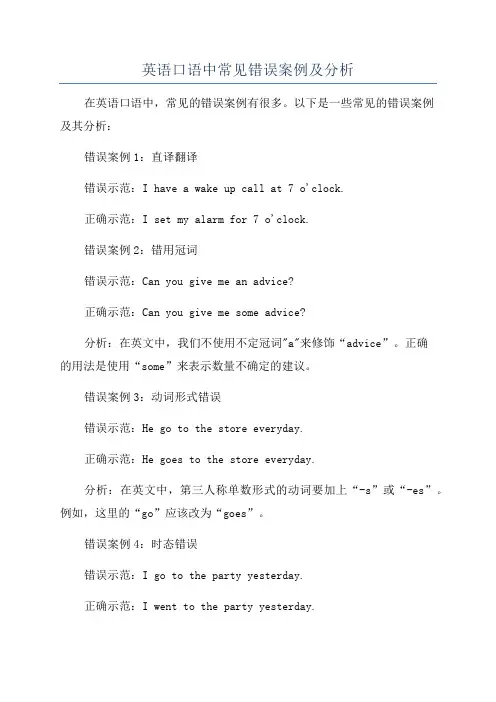
英语口语中常见错误案例及分析在英语口语中,常见的错误案例有很多。
以下是一些常见的错误案例及其分析:错误案例1:直译翻译错误示范:I have a wake up call at 7 o'clock.正确示范:I set my alarm for 7 o'clock.错误案例2:错用冠词错误示范:Can you give me an advice?正确示范:Can you give me some advice?分析:在英文中,我们不使用不定冠词"a"来修饰“advice”。
正确的用法是使用“some”来表示数量不确定的建议。
错误案例3:动词形式错误错误示范:He go to the store everyday.正确示范:He goes to the store everyday.分析:在英文中,第三人称单数形式的动词要加上“-s”或“-es”。
例如,这里的“go”应该改为“goes”。
错误案例4:时态错误错误示范:I go to the party yesterday.正确示范:I went to the party yesterday.分析:在英文中,我们使用过去式表示过去发生的动作。
因此,这里的“go”应该改为过去式“went”。
错误案例5:主谓一致错误错误示范:The book is interesting. They are about history.正确示范:The book is interesting. It is about history.分析:在英文中,主语和谓语动词要保持一致。
这里的主语是“the book”,所以谓语动词应该是单数形式的“is”。
错误案例6:词序错误错误示范:Yesterday I go to the store.正确示范:I went to the store yesterday.分析:英文中的词序为主语-动词-宾语,时间状语放在句子的最后面。
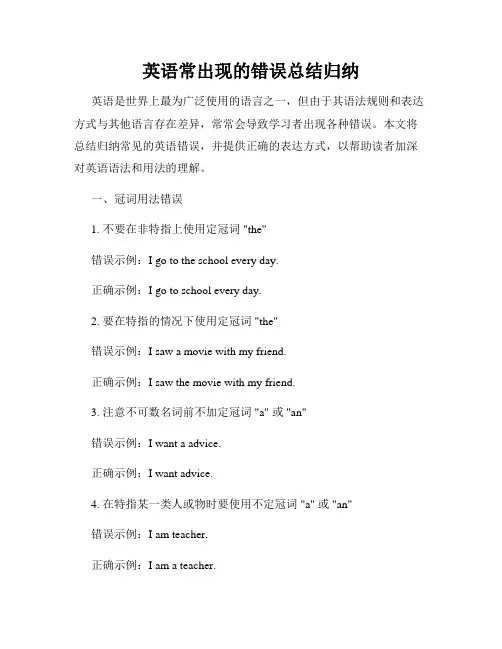
英语常出现的错误总结归纳英语是世界上最为广泛使用的语言之一,但由于其语法规则和表达方式与其他语言存在差异,常常会导致学习者出现各种错误。
本文将总结归纳常见的英语错误,并提供正确的表达方式,以帮助读者加深对英语语法和用法的理解。
一、冠词用法错误1. 不要在非特指上使用定冠词 "the"错误示例:I go to the school every day.正确示例:I go to school every day.2. 要在特指的情况下使用定冠词 "the"错误示例:I saw a movie with my friend.正确示例:I saw the movie with my friend.3. 注意不可数名词前不加定冠词 "a" 或 "an"错误示例:I want a advice.正确示例:I want advice.4. 在特指某一类人或物时要使用不定冠词 "a" 或 "an"错误示例:I am teacher.正确示例:I am a teacher.二、时态和语态错误1. 使用一般过去时表示现在的动作错误示例:Yesterday, I go to the library.正确示例:Yesterday, I went to the library. 2. 使用现在进行时表示未来的动作错误示例:I am meeting my friend tomorrow.正确示例:I will meet my friend tomorrow.3. 使用被动语态时要注意动词形式的变化错误示例:The cake made by me.正确示例:The cake was made by me.三、动词形式错误1. 不要在动词后面加 "-s" 形成复数形式错误示例:He go to school every day.正确示例:He goes to school every day.2. 使用不正确的动词时态错误示例:I have went to the supermarket.正确示例:I have gone to the supermarket.3. 不要忽略动词不定式 "to"错误示例:I want go home.正确示例:I want to go home.四、形容词和副词的用法错误1. 不要使用形容词修饰动词错误示例:He speaks English good.正确示例:He speaks English well.2. 不要使用形容词修饰名词错误示例:I have a happy news to tell you.正确示例:I have happy news to tell you.3. 注意副词在句中的位置错误示例:I always late for school.正确示例:I am always late for school.五、介词用法错误1. 注意介词的正确搭配错误示例:I am interested in for learning English.正确示例:I am interested in learning English.2. 介词后使用动词原形错误示例:I am good at to play basketball.正确示例:I am good at playing basketball.六、固定搭配和习惯用语错误1. 注意习惯用语的正确使用错误示例:I made my homework.正确示例:I did my homework.2. 注意固定搭配的正确表达方式错误示例:I go to the bed.正确示例:I go to bed.七、词汇使用错误1. 不要使用同音异义词错误替换错误示例:I read a new book yesterday.正确示例:I read a new newspaper yesterday.2. 注意动词和名词的不同用法错误示例:I have a look to the picture.正确示例:I take a look at the picture.综上所述,英语学习中常见的错误包括冠词用法错误、时态和语态错误、动词形式错误、形容词和副词的用法错误、介词用法错误、固定搭配和习惯用语错误以及词汇使用错误等。
报告撰写中的语法和拼写错误常见例子一、语法错误1.主谓一致错误:如句子中的主语与谓语不一致。
例如:“我的朋友们都喜欢运动”应改为“我的朋友们都喜欢运动”。
2.倒装句错误:即将谓语动词放在主语之前,破坏了正常的语序。
例如:“Inthe garden runs a little girl”应改为“A little girl runs in the garden”。
3.动词时态错误:如将过去时与现在时混用。
例如:“我昨天去商店买书”应改为“我昨天去商店买了书”。
4.从句错位:即宾语从句应放在及物动词之后,但被放在了其他位置。
例如:“我告诉你看到的那个人是我的朋友”应改为“我告诉你,你看到的那个人是我的朋友”。
5.缺少连接词:如在句子中应添加适当的连接词来连接两个独立的子句。
例如:“我喜欢读书我也喜欢看电影”应改为“我喜欢读书,而且我也喜欢看电影”。
6.时态转换错误:如在时间状语从句中使用了错误的时态。
例如:“当我到达那里,他告诉我他已经离开了”应改为“当我到达那里,他告诉我他已经离开”。
二、拼写错误1.单词拼写错误:如将单词的字母顺序颠倒或者漏写某些字母。
例如:“today”拼写为“todat”。
2.单词误用:如将一个单词错误地替换为另一个具有相似拼写的单词。
例如:“accept”误写为“except”。
3.连字符使用错误:如将两个独立的单词连字符号连在一起。
例如:“highschool”应改为“high school”。
4.名词复数错误:如将单数名词误写为复数形式,或者将复数名词误写为单数形式。
例如:“childern”应改为“children”。
5.标点符号错误:如在句子中使用不正确的标点符号或者缺少适当的标点符号。
例如:“这是一个有趣的问题我想认真探讨一下”应改为“这是一个有趣的问题,我想认真探讨一下。
”6.英语大小写混用:如在句子中不正确地使用大写或小写字母。
例如:“i love reading BOOKS”应改为“I love reading books”。
四级语法常见错误总结一、代词的一致性错误代词与其所代替的名词在性、数、人称上应保持一致。
常见错误包括:1. 主谓代词一致性错误:例子:Neither of the boys have finished their homework.改正:Neither of the boys has finished his homework.2. 主、宾语代词一致性错误:例子:Everyone should do what they can to protect the environment.改正:Everyone should do what he or she can to protect the environment.3. 名词所有格代词一致性错误:例子:The students should bring there books to his or her desk.改正:The students should bring their books to their desks.二、动词时态和语态错误1. 时态错误:学生常常在叙述过去事件时使用错误的时态,如将过去事件使用现在进行时等。
例子:Last night, I am going to the theater.改正:Last night, I went to the theater.2. 语态错误:例子:The tree was cut down by my father.改正:The tree was cut down by me.三、冠词误用1. 不必要的冠词使用错误:例子:I saw a interesting movie yesterday.改正:I saw an interesting movie yesterday.2. 缺少必要的冠词:例子:He is student.改正:He is a student.四、介词和动词搭配错误1. 使用错误的介词:例子:I am interested with learning English.改正:I am interested in learning English.2. 动词搭配错误:例子:She depends for me to help her.改正:She depends on me to help her.五、句子结构错误1. 并列句结构错误:例子:I like to watch movies, but I don't like swimming.改正:I like to watch movies, but I don't like to swim.2. 定语从句结构错误:例子:The book, that I borrowed it from the library, is very interesting.改正:The book, which I borrowed from the library, is very interesting.六、介词的位置错误介词通常应该放在它所修饰的名词或代词之后。
初学者常犯的英语语法错误英语是一门广泛应用的国际语言,许多人学习英语以便更好地沟通和获得更好的工作机会。
尽管这种语言通常被称为“容易学习的语言”,但它也充满了许多令初学者困扰的语法错误。
本文将讨论初学者常犯的英语语法错误,并提供有关如何避免这些错误的建议。
一、主谓不一致错误主谓不一致错误是许多初学者犯的常见语法错误之一。
在英语语法中,“主语”和“谓语”必须匹配。
例如,如果主语是单数,那么谓语动词必须是单数形式。
如果主语是复数,那么谓语动词必须是复数形式。
以下是一些常见的主谓不一致错误:错误例子:- 他们每天早上醒来后喝咖啡。
(主语:他们,谓语动词:喝咖啡,错误原因:主语是复数,但谓语动词却是单数形式)- 他的家人和他不想去那里。
(主语:他的家人和他,谓语动词:不想去那里,错误原因:主语是复数,但谓语动词却是单数形式)- 我的朋友每年都去度假。
(主语:我的朋友,谓语动词:去度假,错误原因:主语是单数,但谓语动词却是复数形式)- 我每天都锻炼身体。
(主语:我,谓语动词:锻炼身体,句子正确)- 他们喜欢看电影。
(主语:他们,谓语动词:喜欢看电影,句子正确)- 她的朋友都穿着漂亮的裙子。
(主语:她的朋友,谓语动词:都穿着漂亮的裙子,句子正确)二、时态错误时态错误也是初学者常犯的错误之一。
在英语语法中,时态是指动词所处的时间。
时态错误通常出现在动词的错用上。
以下是一些常见的时态错误:错误例子:- 我昨天去图书馆还书。
(错误原因:动词的时态应该是“借书”,因为“还书”是过去式,表示一种已经完成的动作,与句子主语“我”不符。
)- 我正在吃晚饭当电话响了。
(错误原因:正在进行的动作应该使用现在进行时态“正在吃晚饭”,而不是一般过去时态)- 如果我知道这件事我不会嫁给他的。
(错误原因:虚拟语气需要使用过去式“if I knew”,而不是“if I know”)- 我正在学习英语。
(正确使用现在进行时态)- 我今天早上去健身房。
语法错误的辨析与纠正技巧总结与应用语法是语言的基础,准确使用语法规则对于有效沟通至关重要。
然而,由于语言的复杂性,语法错误经常发生。
本文将总结与应用一些常见的语法错误辨析与纠正技巧,帮助读者加强语法意识,提高书写准确性。
一、主谓一致错误主谓一致错误是英语语法中最常见的错误之一。
它发生在主语与谓语在人称和数上不一致的情况下。
1. 当主语是第三人称单数时,谓语动词应使用第三人称单数形式。
例如:- He walks to school every day.- She likes to eat fruits.2. 谓语动词与主语之间的连接词不影响主谓一致性。
例如:- The book or the pens are on the desk.3. 就近原则:当主语由两个或多个单数名词或代词组成时,谓语动词应与离它最近的主语保持一致。
例如:- Neither the cat nor the dogs like to swim.二、冠词错误冠词错误是另一种常见的语法错误类型。
正确使用冠词有助于明确名词的特定性和泛指性。
1. 定冠词“the”:- 用于特指的名词前,表示这个名词是唯一的或已被提及。
例如:- The car is red.- The cat is playing.2. 不定冠词“a/an”:- 用于表示泛指或不唯一的名词前,表示任意一个或一种。
例如:- I have a cat.- He wants to buy an apple.三、时态错误时态错误是语法错误中较为常见的一种类型。
时态的不正确使用可能导致表达的时间含义不准确。
1. 现在时态:- 表示当前状态或经常性动作。
- 现在简单时态(Simple Present Tense):一般陈述事实或经常性动作。
例如:- She works in a hospital.- They play football every Sunday.2. 过去时态:- 表示过去发生的动作或状态。
常见英语语法错误1.句子成分残缺不全We always working till late at night before taking exams.(误)We are always working /We always work till late at night before taking exams(正)We should read books may be useful to us. (误)We should read books which may be useful to us. (正)2.句子成分多余This test is end, but there is another test is waiting for you. (误)One test ends, but another is waiting for you. (正)The driver of the red car was died on the spot. (误)The driver of the red car died on the spot. (正)3.主谓不一致Someone/Somebody think that reading should be selective. (误)Some think that reading should be selective. (正)My sister go to the cinema at least once a week. (误)My sister goes to the cinema at least once a week. (正)4.动词时态、语态的误用I was walking along the road, and there are not so many cars on the street. (误)I was walking along the road and there were not so many vehicles on the street. (正)We have little time to read some books which we interest. (误)We have little time to read some books in which we are interested. (正)I am a student who has studying in the college for two years. (误)I have been studying in the college for two years(正)5.词类混淆It is my point that reading must be selectively.(误)In my opinion, reading must be selective. (正)Honest is so important for every person. (误)Honesty is so important for everyone. (正)The old man was hit by a car when he across the street.(误)The old man was hit by a car when he was crossing the street. (正)6.名词可数与不可数的误用Too much tests are d isadvantage for students’ study. (误)Too many tests are disadvantageous to students. (正)In modern society, people are under various pressures(误)In modern society, people are under various kinds of pressure. (正)7.动词及物与不及物的误用The traffic accident was taken place at the junction of two highways. (误)The traffic accident took place at the junction of two highways. (正)Because of his excellent performance, the boss rose his salary. (误)Because of his excellent performance, the boss raised his salary. (正)8.介词to和不定式符号的混淆Too many tests will do harm to cultivate our independent thinking. (误)Too many tests will do harm to the cultivation of our independent thinking. (正)All these contributed to solve the serious problem. (误)All these contributed to the solution to the serious problem. (正)9.情态动词的误用It may not good to our health. (误)It may be not good to our health. (正)They should spent much time. (误)They should spend much time. (正)10. There be句型的误用There exists some new problems such as being dishonest. (误)There exist/arise some new problems such as being dishonest. (正)There are many way to solve the tuition and fees of college education. (误)There are many ways to raise the money for the tuition and fees for college education. (正)1.动宾搭配不当We must pay attention to it and make solutions to the problem. (误)We must pay attention and find a solution to the problem. (正)It also may help you to make success. (误)It may also help you succeed/obtain your goal. (正)2.根据中文逐字硬译If someone’s family situation is not well, he can apply for loan to bank. (误)If one’s family is not well off, he can apply to the bank for a loan. (正)Let alone touch the outside world of campus/keep a good body health(误)Let alone get in touch with the world outside of the campus/keep fit(正)上面这些错误比较典型、集中,请大家务必要注意,其他的错误,如单词拼写、大小写、标点符号的误用等,可谓千姿百态,无奇不有,在此就不一一列举。
理解中学生英语语法错误的七个常见例子1. 主谓一致错误中学生在学习英语语法时,常常犯下主谓一致错误。
这种错误发生在主语和谓语动词之间,当主语是单数形式时,谓语也应该是单数形式;反之,当主语是复数形式时,谓语也应该是复数形式。
例如,他们经常犯下类似于“The boys is playing basketball”这样的错误,正确的应该是“The boys are playing basketball”。
2. 冠词错误另一个常见的错误是冠词的使用问题。
中学生在学习英语时,经常混淆a和an的使用,而忽视了单数和复数名词以及可数名词和不可数名词之间的差异。
例如,他们可能会错误地写成“an apple”而不是“a apple”,或者“a book”而不是“an book”。
3. 时态错误时态的错误也是中学生经常犯的语法错误之一。
时态错误包括混淆过去时、现在时和将来时,以及使用错误的助动词。
例如,他们可能会写成“I go to school yesterday”而不是“I went to school yesterday”,或者“I will went to the movie”而不是“I will go to the movie”。
4. 介词错误介词的使用也是中学生常见的语法错误之一。
他们经常搞混介词的正确用法,导致句子的意思不明确或者句子结构错误。
例如,他们可能会写成“I am go to school by bus”而不是“I go to school by bus”,或者“He is in the cinema”而不是“He is at the cinema”。
5. 句子结构错误中学生在构建句子时,也常常出现句子结构错误。
这种错误包括主谓宾语结构的混淆、从句的错误引导词以及动词形式的错误等等。
例如,他们可能会写成“Tom playing football in the park”而不是“Tom plays football in the park”,或者“I don't know why he is come late”而不是“Idon't know why he comes late”。
英语语法错误经典例子(四)
31.令我们感到高兴的是,他一天天地好了起来。
误:To our delight, he was getting better day after day.
正:To our delight, he was getting better day by day.
析:比较day by day 和day after day:两者均可表示“一天天地”,但含义和用法均有区别:day by day含有逐渐(gradually)转变的意思,在句中主要用作状语;day after day暗示时间之长久(for many many days),在句中可用作状语,也可用作主语或宾语。
比较:Day after day went by, and still no message arrived.. 一天天过去了,还是一直没有消息。
Things are getting worse day by day. 情况一天天变糟。
32.我们都指望他明天能来。
误:We all depend you to come tomorrow.
正:We all depend on you to come tomorrow.
正:We all depend on you coming tomorrow.
正:We all depend on your coming tomorrow.
析:depend不能跟不定式的复合结构作宾语,因为它是不及物动词,后接宾语时,必须用depend on [upon]。
注:depend on 后可以跟不定式的复合结构,并且也可接动名词的复合结构。
另外,此句也可用从句改写:We all depend on it that he will come tomorrow.
33. 这本词典是供外国学生用的。
误:The dictionary is designing for foreign students.
正:The dictionary is designed for foreign students.
析:design用作动词除表示“设计”外,还可表示“计划”“打算”等,如:His father designed him for a lawyer. 他父亲打算要他当律师。
但是,此用法通常用于被动形式,即用于be designed for sb (sth), be designed to do sth, be designed as sth 等。
如:The weekend party was designed to bring the two old men together. 这次周末聚会的用意是要使两位老人见面。
The room was designed as the chil dren’s playroom. 这个房间计划用作儿童游戏室。
34.我不同意我们那么早就出发。
误:I disagree that we should start so early.
正:I don’t agree that we should start so early.
析:与“agree+that从句”不一样,disagree(不同意)后不接that 从句。
顺便说一句,要表示同意做某事,可说agree to do sth,但要表示不同意做某事,不能说disagree to do sth,可根据情况改为not agree to do sth或refuse to do sth等。
35. 我们对现金付款给予九折优惠。
误:We give (a) 90% discount for cash.
正:We give (a) 10% discount for cash.
析:discount(折扣)的实际意思是从某物的价格中扣去的数目,而不是扣除某个数目后剩下的数目,即discount =amount of money taken off the cost of sth。
36.许多年轻人梦想出国。
误:A great many young people dream to go abroad.
正:A great many young people dream of going abroad.
析:动词dream(梦见,梦想)后不能接不定式,若语义上需要这类结构,通常用of doing sth。
注意此用法的否定式:Little did I dream of succeeding so well. 我做梦也没想到会这样成功。
37.这个女人不很聪明,很容易受骗。
误:The woman is not very clever and easy to be cheated.
正:The woman is not very clever and easy to cheat.
析:在“be easy (difficult) +不定式”这类结构中,句子主语通常应是it(如说:It is easy to cheat the woman.),通常不能是指人或物的名词。
但有时也可以用指人或指物的名词作主语,注意此时该主语必须是其后不定式的逻辑宾语,且此时该不定式要用主动式表示被动意义(不直接用被动式)。
又如:The question is easy to answer. 这个问题很容易回答。
(不能用to be answered)
38.这条消息对她没有一点影响。
误:The news did not effect her at all.
正:The news did not affect her at all.
正:The news had no effect on her at all.
析:effect 和affect 均可表示“影响”,但前者是名词,后者是动词。
两者的关系大致为affect =have an effect on,如:To affect a policy is to have an effect on it. 影响一项政策就是对该政策具有一种影响。
注:effect 也可用作动词,但不表示“影响”,而是表示“引起”“产生”或“实现”“达到”等。
39.我泼了些鸡蛋在衣服上。
误:I spilled some eggs on the dress.
正:I spilled some egg on the dress.
析:有的学生认为,egg(鸡蛋)只用作可数名词,其实那是误解。
egg 通常是可数的,其意是指一个个可以数的egg,但是当它敲碎后,我们见到蛋壳内的鸡蛋,便是一种物质了,也就不可数了。
顺便补充一点:作为食物的egg,可能是可数的也可能是不可数的,其区别依然是看它是否能实实在在地被“数”。
40.我拿了别人的雨伞。
误:I’ve taken somebody’s else umbrella.
正:I’ve taken somebody else’s umbrella.
析:若语义上需要所有格,该所有格通常加在else 上。